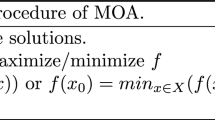Abstract
Genetic programming (GP) is an evolutionary algorithm-based methodology inspired by biological evolution, used to solve complex problems.
Access provided by CONRICYT-eBooks. Download reference work entry PDF
Similar content being viewed by others
Genetic programming is a subclass of evolutionary algorithms, wherein a population of individual programs is evolved. The main mechanism behind genetic programming is that of a genetic algorithm, namely, the repeated cycling through four operations applied to the entire population: evaluate–select–crossover–mutate. Starting with an initial population of randomly generated programs, each individual is evaluated in the domain environment and assigned a fitness value representing how well the individual solves the problem at hand. Being randomly generated, the first-generation individuals usually exhibit poor performance. However, some individuals are better than others, that is, as in nature, variability exists, and through the mechanism of selection, these have a higher probability of being selected to parent the next generation. The size of the population is finite and usually constant.
See Evolutionary Games for a more detailed explanation of genetic programming.
Author information
Authors and Affiliations
Corresponding author
Editor information
Editors and Affiliations
Rights and permissions
Copyright information
© 2017 Springer Science+Business Media New York
About this entry
Cite this entry
Sipper, M. (2017). Genetic Programming. In: Sammut, C., Webb, G.I. (eds) Encyclopedia of Machine Learning and Data Mining. Springer, Boston, MA. https://doi.org/10.1007/978-1-4899-7687-1_376
Download citation
DOI: https://doi.org/10.1007/978-1-4899-7687-1_376
Published:
Publisher Name: Springer, Boston, MA
Print ISBN: 978-1-4899-7685-7
Online ISBN: 978-1-4899-7687-1
eBook Packages: Computer ScienceReference Module Computer Science and Engineering




